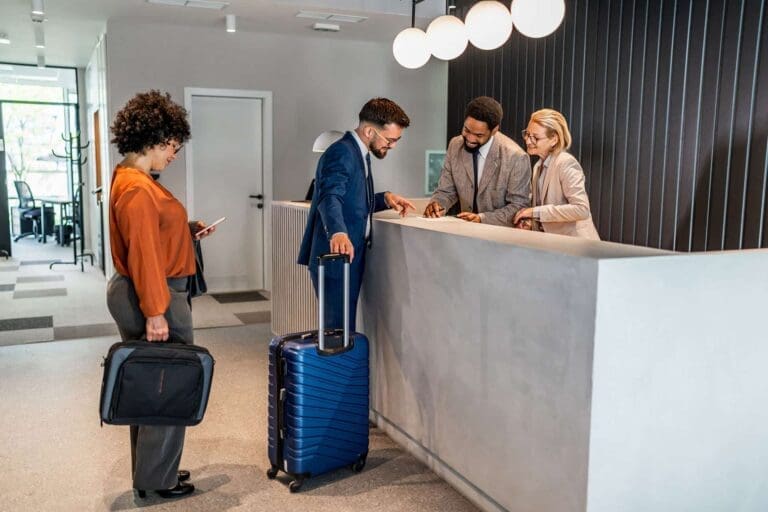 What is one singular action that your hotel can take in Q4 2022 and early 2023 to lay a solid foundation for future revenue growth and evolving guest demands?
What is one singular action that your hotel can take in Q4 2022 and early 2023 to lay a solid foundation for future revenue growth and evolving guest demands?
Hotel operations have never had a silver bullet in this sense, but the long-term trend is that of automation and more tech-driven guest touchpoints to free up teams to execute more complex tasks elsewhere.
As it’s now time to start thinking about the ‘post-post-pandemic’, let’s focus this discussion of automation, and the broader goal of improving guest service, around the in-room tablet and what it can do to boost operations. Key to this to is think in terms of optimizing total revenue per guest (TRevPAR) while sustaining current net operating incomes – that is, topline growth with marginal cost. For this, technologies like in-room tablets help by giving guests a convenient way to browse through then purchase additional services at a static or low-commission SaaS fee.
Why In-Room Tablets Are Now Critical
The smart-room tablets offered by leading hotel industry vendors show how the near-term pain of installation and staff retraining are far offset by incremental revenues, increased labor productivity and the flexibility to accommodate future service enhancements.
To elaborate on this, smart-room tablets come with the following key advantages:
- Offering a convenient and intuitive user interface for guests to learn about the property, explore the local area and order room service or reserve additional services like spa appointments
- Providing a content-as-a-service (CaaS) channel for personalized promotions and additional TRevPAR as well as third-party advertising revenue sharing
- Addressing basic guest inquiries and automating service orders to reduce the workload that these incur on front desk associates, freeing up their time for other tasks
- Newer tablets use materials and production methods that increase their durability against drops and corrosion from cleaning or sanitization applications
- Getting more granular data on guest demands to feed into business intelligence software and make highly informed decisions to guide future initiatives
- Acting as the control hub for the totality of IoT-enabled ‘connected room’ features including, but not limited it, thermostats, lighting, alarm clocks, blinds, TVs and smart speakers
Before we get too far into the alphabet soup of all the applicable technology acronyms, what’s most critical here is that your company seek out automation tools as a means of liberating your team from the interruptive ‘busywork’ that can stress them out and prevent them from rolling out new projects that are necessary for product evolution.
Right now, amidst the peak of peak seasons afforded to us by the current travel recovery, the goal of reducing busywork can be hard to devote time towards. And yet it is essential to get underway right now with a firm process for automation deployment so that you don’t try to change too fast and experience service delivery hiccups as a result.
A Southern California Example
To help show what in-room tablets can offer, we touched base with Tyrone Flowers, the Assistant General Manager at H20 Hermosa Beach which recruited INTELITY as its tablet solution vendor.
Nestled in this beachside community within the greater Los Angeles area, H20 Hermosa Beach excels offering a relaxed, boutique luxury experience typical for Southern California and expedited the tablet solution installation by recruiting an external IT team to handle the setup amidst ongoing high occupancies straining the onsite team.
“As may be apparent already, we were looking for a smart-room tablet solution that would help introduce guests to the area and alleviate our command center, the front desk,” commented Flowers. “Being walking distance from the beach, we get a lot of families and sporting tournament guests, translating into lots of different needs and questions from this healthy blend of corporate and leisure. The tablets have helped us to quickly answer some of these inquiries and relay service requests so that we can maintain our local market leadership.”
While the most popular usages for in-room tablets vary by brand and territory, Flowers remarked that the guests at H20 were particularly keen on using these devices for completing minibar purchases as well as the occasional housekeeping request to help round out a great onsite experience.
Overall, Flowers highlights that the tablet solution at H20 will nonetheless require some finessing as guest behaviors change. Like practically any other initiative, it is a work in progress and that needs reevaluation and tweaking.
Once installed, though, it is easier to execute future upgrades because the hotel team has more bandwidth to focus on the rapid turnaround of these updates. Again, it all comes down to time and enabling your team for both near-term and long-term success. Our hope is that, from this example and the bullet points above, you consider what smart-room tablets can do for your hotel brand.


















